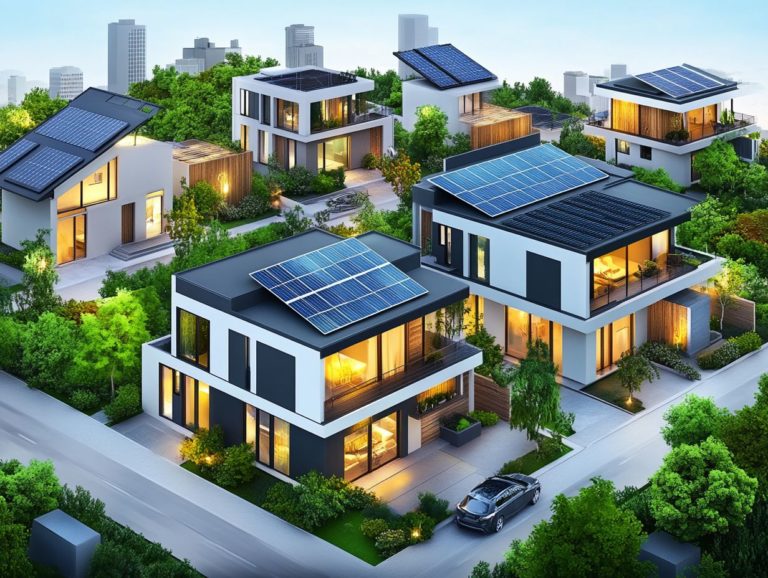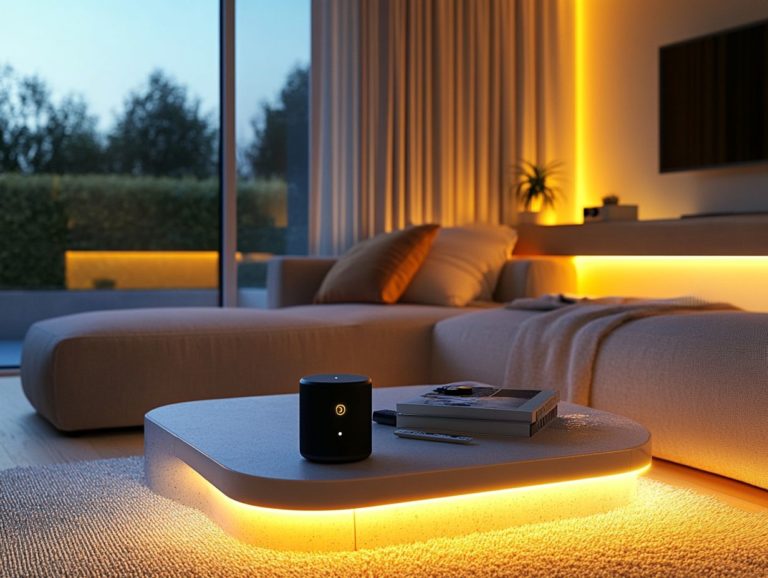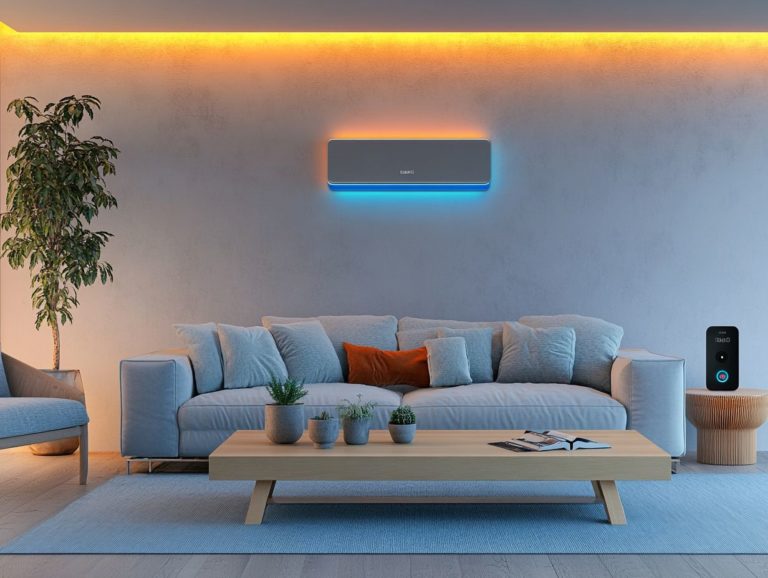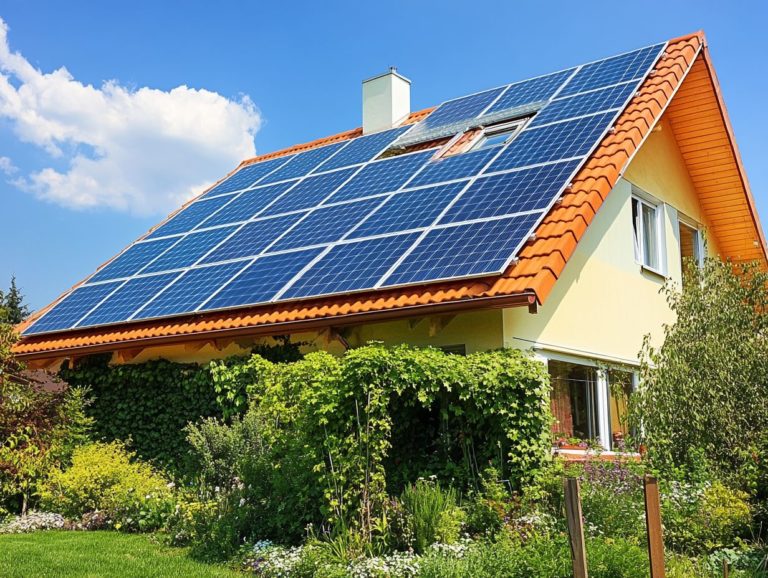How Smart Home Tech Can Benefit the Environment
Smart home technology is changing the way you live, offering exciting benefits that go beyond convenience. It provides unparalleled comfort while delivering noteworthy environmental benefits.
By reducing energy consumption, minimizing waste, and enhancing indoor air quality, these innovative devices can transform your home into a more sustainable space. This article delves into how smart home tech functions, the advantages it offers homeowners like you, and its positive impact on the planet.
You ll also find key considerations to ponder before making the switch. Dive in to uncover how these advancements can elevate both your lifestyle and the environment.
Contents
- Key Takeaways:
- The Impact of Smart Home Technology on the Environment
- How Smart Home Tech Works
- Benefits for Homeowners
- Benefits for the Environment
- Considerations Before Implementing Smart Home Tech
- Frequently Asked Questions
- How can smart home tech benefit the environment?
- What are some specific examples of how smart home tech can benefit the environment?
- How can smart home tech help reduce energy consumption?
- Can smart home tech help minimize waste?
- Is Smart Home Tech a Sustainable Option?
- Are There Any Financial Benefits to Using Smart Home Tech?
Key Takeaways:
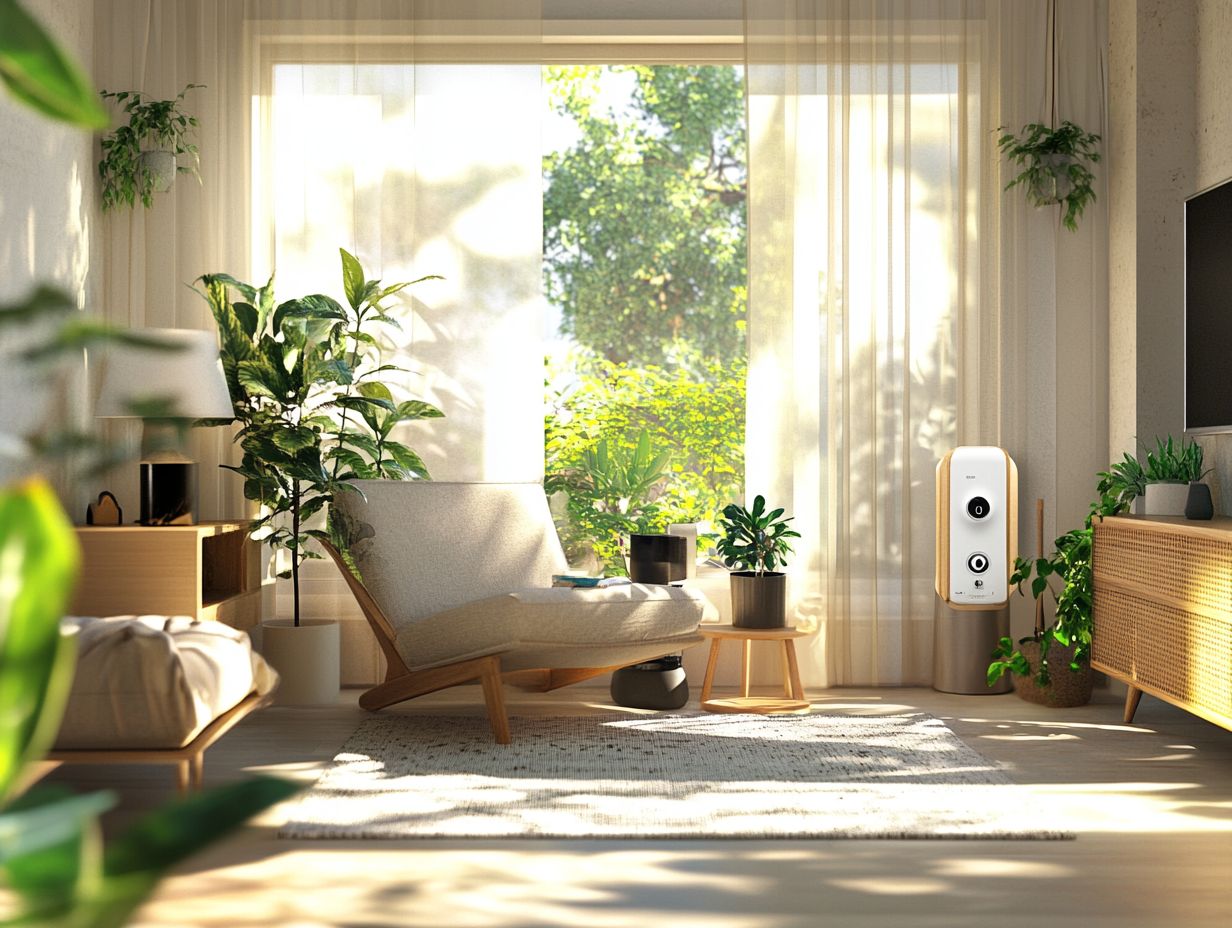
Smart home technology makes it easy to save energy, cut down on waste, and improve air quality. Discover the benefits of smart home energy management to take control of your home and enjoy savings while helping the planet!
The Impact of Smart Home Technology on the Environment
Smart home technology offers a plethora of advantages that go beyond just being convenient. For instance, how smart home tech can boost security significantly enhances safety, while it also promotes energy efficiency and sustainability.
By adopting advanced products like smart thermostats devices that automatically adjust your home s temperature based on your habits intelligent lighting, and comprehensive home automation systems, you can effortlessly monitor and control your energy consumption while reducing your ecological footprint.
The incorporation of devices such as smart energy meters and home sensors provides you with real-time insights into your energy usage, giving you the power to make well-informed decisions that lead to a more sustainable lifestyle.
Reducing Energy Consumption
Reducing energy consumption is one of the most compelling benefits of embracing smart home technology. You have the power to optimize your energy usage and unlock significant savings.
Consider smart thermostats that intelligently adjust heating and cooling. Energy management systems offer valuable insights into the performance of your heating, ventilation, and air conditioning systems as well as your energy consumption patterns.
Automated blinds are another effective way to reduce your reliance on artificial lighting and heating. They adjust based on the time of day and weather conditions, making your home more efficient.
Smart appliances like refrigerators and washing machines are designed to operate during off-peak energy hours, significantly slashing your electricity costs. With smart lighting solutions that can be programmed to turn on and off based on occupancy, you ensure that energy isn t wasted in empty rooms.
All these interconnected technologies work together to create a seamless environment that enhances your comfort while promoting responsible energy use.
Minimizing Waste
Minimizing waste is essential in your journey toward creating an eco-smart home, and smart home technology plays a crucial role in reaching that goal. By embracing smart appliances and implementing energy-saving measures, you can significantly cut down on waste from unnecessary energy consumption and resource usage.
Among the array of available solutions, smart irrigation systems truly shine. They optimize water usage based on real-time weather conditions and soil moisture levels, effectively preventing overwatering and waste.
In the same vein, smart energy meters give you the power to monitor your electricity use in real-time, offering insights that enable you to adjust consumption and pinpoint energy leaks.
Integrating smart thermostats can further elevate your energy efficiency. These devices learn your household’s routines and automatically adjust temperatures to minimize excess HVAC operation.
Together, these innovations cultivate a more sustainable living environment, reducing your overall carbon footprint while also trimming down those utility bills.
Improving Air Quality
Improving indoor air quality is a compelling advantage of smart home technology. It allows you to take charge of your living environment for better health and comfort.
By utilizing smart devices like air quality sensors and heating and cooling systems that you can control, you can significantly enhance the air quality in your home. These tools monitor pollutants and regulate ventilation with remarkable precision.
Smart air purifiers are essential players in this arena. These sophisticated devices come with real-time monitoring features that detect harmful particles and allergens.
They automatically adjust their filtration levels to ensure your atmosphere remains pristine. By filtering out irritants such as dust, pollen, and pet dander, smart air purifiers foster a healthier indoor environment.
As a result, you may find yourself experiencing fewer allergy symptoms and enjoying an overall boost in well-being. Your living space can transform into a sanctuary of comfort.
This blend of technology and health shows the importance of investing in smart home solutions for optimal air quality management.
How Smart Home Tech Works
It’s important to understand how smart home technology works to improve your home. Homeowners aiming to elevate their living spaces with these modern advancements will benefit.
Smart home systems comprise a range of devices that work together. They communicate through the internet, enabling effortless automation and control over various aspects of your home, from lighting to climate control.
Overview of Smart Home Devices

Smart home devices encompass a range of innovative technologies designed to elevate your everyday living experience. From smart thermostats that keep your climate just right to smart lighting systems that adapt to your preferences, these devices work in harmony.
Imagine having advanced security cameras that keep an eye on your property 24/7. Coupled with voice-activated assistants, they manage multiple functions at your command.
These technologies streamline your daily tasks and give you the power to oversee and control your home remotely. Consider appliances like smart refrigerators and washing machines that keep you informed about their status.
These smart devices ensure optimal performance while saving you valuable time and resources. With seamless integration through smart hubs and apps, they enhance your home automation.
Integration and Automation
Integration and automation lie at the core of smart home technology, giving you the power to create a seamless network of connected devices. This elevates both functionality and efficiency.
By embracing solutions like automated lighting, smart energy meters, and voice control systems, you can transform your living environment into a more convenient and responsive haven.
This interconnectedness allows various devices such as thermostats, security systems, and appliances to communicate effortlessly. The result is amazing! You ll have a home that adapts to your routines effortlessly.
Imagine this: as you leave for work, your smart automation system takes charge. It turns off the lights, adjusts the thermostat to conserve energy, and activates security cameras all without you lifting a finger.
The advantages extend beyond mere convenience; they encompass significant cost savings and enhanced security. With the latest advancements in artificial intelligence and machine learning, smart home systems become increasingly intuitive.
This means your home doesn’t just automate tasks; it responds intelligently to your needs. You can create a living space that truly caters to you.
Benefits for Homeowners
The advantages of smart home technology for homeowners are extensive. They touch on areas like cost savings, elevated convenience, and enhanced comfort throughout your living space.
By embracing smart devices and efficient systems, you can enjoy a contemporary lifestyle. You will achieve substantial reductions in energy costs and minimize waste.
Don’t miss out on these incredible benefits! Invest in smart technology today for a better tomorrow.
Cost Savings
Cost savings stand out as one of the most compelling reasons to embrace smart home technology. It can lead to significant reductions in your utility bills and overall expenses.
By using energy-efficient appliances and smart energy meters, you gain valuable insights into your energy consumption. This allows you to implement effective strategies for energy management.
Automatic systems, like programmable thermostats, adjust heating and cooling patterns based on your home’s occupancy. This further enhances energy efficiency. These devices learn your family’s habits to optimize usage, ensuring no energy is wasted when your home is empty.
Smart lighting systems automatically adjust brightness based on natural light levels, which means less electricity is consumed during bright daylight hours. With features like remote access and real-time monitoring, you can easily manage your consumption. This leads to intelligent decisions that ultimately result in noticeable savings on your monthly bills.
Convenience and Comfort
The convenience and comfort offered by smart home technology are truly unparalleled, giving you the power to effortlessly control your living space through remote access and automation. Whether you’re adjusting the thermostat, managing your lighting, or overseeing security systems, smart home technology transforms your comfort experience.
By integrating devices like smart speakers and automated blinds, you can effortlessly craft an atmosphere tailored to your preferences with just a voice command. Picture this: waking up to the gentle glow of smart lights gradually brightening your room while the thermostat tunes itself to the perfect cozy temperature.
Simultaneously, smart security cameras grant you peace of mind, allowing you to monitor your property from virtually anywhere.
Innovative solutions, like smart kitchen appliances, streamline your daily tasks. Imagine a refrigerator that not only tracks your inventory but also suggests recipes based on what you have on hand, enhancing both convenience and efficiency in your everyday routines.
Benefits for the Environment
The advantages of smart home tech reach far beyond your household, making a significant positive impact on the environment.
By reducing carbon footprints and encouraging sustainable living, these innovations are essential in the fight against climate change.
With eco-friendly solutions and energy-saving measures, your smart home is not just a modern convenience; by using smart tech to monitor home energy use, it actively contributes to minimizing environmental impact and fostering a healthier planet.
Reducing Carbon Footprint
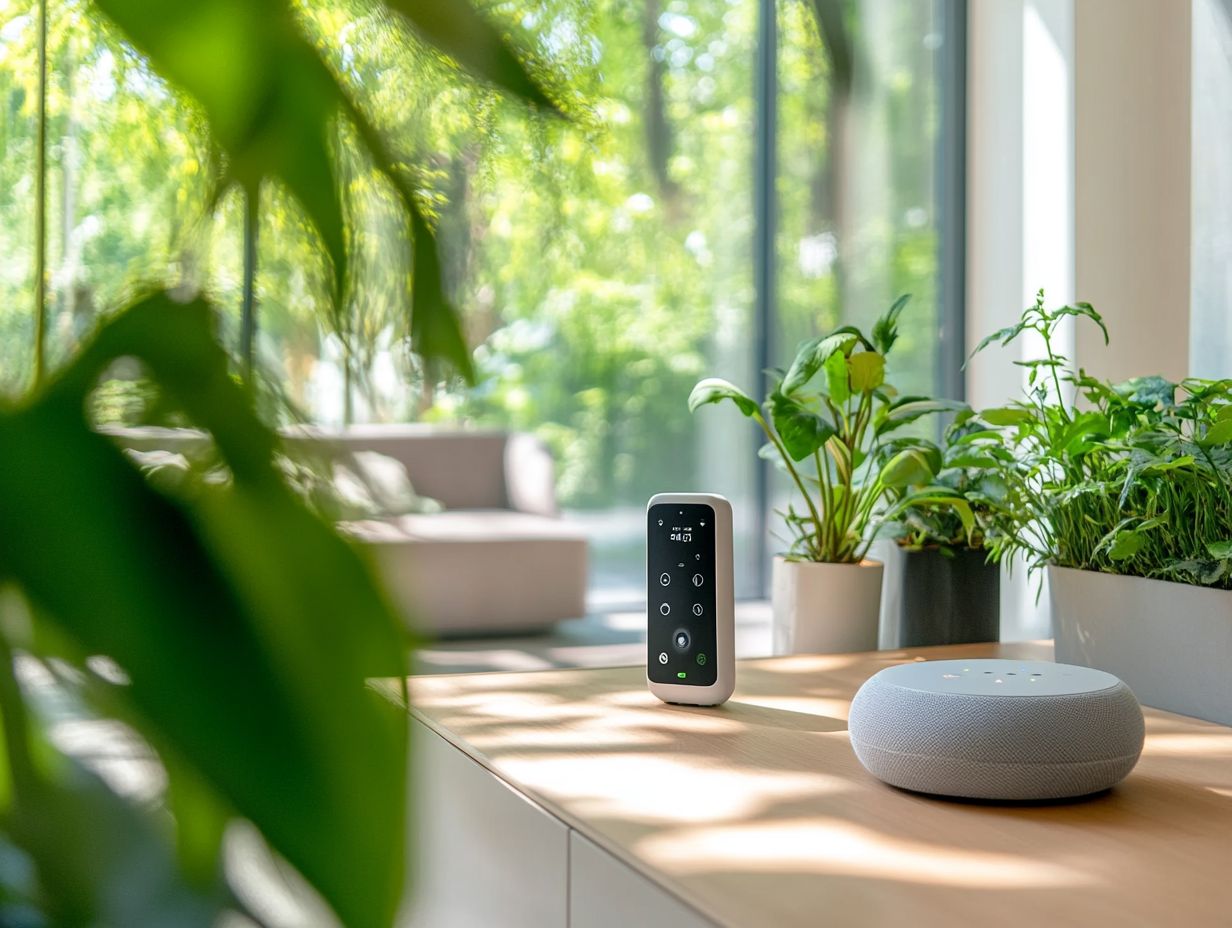
Smart home technology aims to reduce your carbon footprint by providing innovative solutions that boost energy efficiency and promote sustainable practices, as highlighted in the top 10 benefits of smart home technology.
By using smart energy meters and energy-efficient appliances, you can significantly lower your carbon emissions. Integrating smart thermostats is vital, enabling you to make real-time adjustments based on your usage patterns and current weather conditions.
You can also harness the potential of solar energy systems, paired with battery storage, to maximize the use of renewable resources. Automated lighting systems that adjust based on occupancy not only enhance convenience but also minimize unnecessary energy consumption.
These advanced technologies work together effortlessly to create an eco-friendly living environment, aligning your everyday activities with broader environmental sustainability goals.
Promoting Sustainable Living
Promoting sustainable living is at the heart of smart home devices for energy efficiency, giving you the power to make eco-friendly choices while managing your resources effectively.
Solutions like smart irrigation systems and energy management tools are your allies in conserving water and energy, supporting a lifestyle that respects the planet.
By using smart thermostats that learn your habits, you can optimize your heating and cooling, effectively reducing energy waste. Smart lighting systems allow you to adjust brightness based on natural light, enhancing comfort while cutting down on electricity usage.
These innovative technologies enable you to track your consumption patterns through intuitive software applications. This makes it easier to make informed decisions that help lower your carbon footprint.
Ultimately, these advanced devices create a seamless intersection between technology and sustainability, inspiring you to embrace a more ecologically responsible way of living.
Start using these technologies today to transform your home for a sustainable future!
Considerations Before Implementing Smart Home Tech
Before diving into smart home technology, weigh several important factors. This will help you make informed decisions.
Consider the costs involved, how well the devices will connect to your existing systems, and any potential privacy and security concerns. By understanding these elements, you’ll be better equipped to seamlessly incorporate smart devices into your home.
Cost and Compatibility
Cost and compatibility are two pivotal factors you must evaluate when considering smart home technology. These elements significantly impact the overall effectiveness of your smart systems.
It’s essential to grasp the initial investment required while ensuring that any new devices will integrate smoothly with your existing setups for optimal energy management.
Don’t forget to weigh the potential long-term savings on energy bills that enhanced efficiency from smart devices can bring.
Thorough research on various brands and models is crucial, as not all devices are created equal in terms of longevity and performance. This careful evaluation helps you avoid compatibility issues down the road, where certain devices may struggle to communicate effectively or could demand constant troubleshooting.
Being aware of the ecosystem of smart home products and their interoperability can truly elevate your experience, transforming a straightforward technological upgrade into a seamless and cost-effective enhancement of your living environment.
Privacy and Security Concerns
Privacy and security concerns are paramount when integrating smart home technology. These systems often consist of devices that connect to each other, making them susceptible to breaches. Take charge of your security now to enjoy smart technology safely!
With the rise of devices like smart cameras, thermostats, and voice assistants, ensuring their security becomes critical. Each connection point presents a potential entry for cybercriminals, so adopt strong passwords, enable two-factor authentication, and regularly update device firmware.
Be attentive to data sharing policies and limit permissions to significantly enhance your security. Regularly monitor your connected devices for any unusual activity to mitigate risks, allowing you to enjoy the convenience of smart technology while effectively protecting your privacy.
Frequently Asked Questions
How can smart home tech benefit the environment?

Smart home tech can benefit the environment in several ways. It can help reduce energy consumption, minimize waste, and promote sustainable living. By understanding the environmental benefits of smart homes, you can see how automating and optimizing various tasks in the home can help reduce your carbon footprint and contribute to a healthier planet.
What are some specific examples of how smart home tech can benefit the environment?
- Using smart thermostats to regulate temperature and save energy.
- Automating lights and appliances to reduce unnecessary energy use.
- Installing water monitoring systems to conserve water usage.
- Implementing smart irrigation systems for efficient watering of plants.
- Utilizing smart home energy management systems to track and control energy usage.
- Using smart refrigerators to reduce food waste by monitoring expiration dates and suggesting recipes.
How can smart home tech help reduce energy consumption?
Smart home tech can help reduce energy consumption by allowing users to monitor and control their energy usage in real-time. This includes setting schedules for lights and appliances, adjusting thermostat settings, and receiving notifications for abnormal energy usage.
Can smart home tech help minimize waste?
Yes, smart home tech can help minimize waste by automating tasks such as grocery shopping and meal planning. This can reduce food waste and save resources. Smart home tech can also assist with recycling and composting by providing reminders and tracking systems.
Start your journey into smart living today!
Is Smart Home Tech a Sustainable Option?
Yes, smart home technology for energy savings can be a sustainable choice for homeowners! It optimizes energy use, reduces waste, and encourages eco-friendly habits. This contributes to a more sustainable lifestyle and lessens your household’s environmental impact.
Are There Any Financial Benefits to Using Smart Home Tech?
Absolutely! By cutting down on energy use and waste, homeowners can save money on their utility bills. Some smart home products even qualify for tax incentives or rebates, making them a more affordable option overall.

